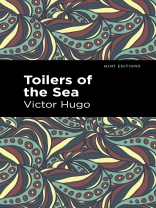Toilers of the Sea (1866) is a novel by Victor Hugo. Written while Hugo was living in exile on the island of Guernsey, Toilers of the Sea is a story of adventure that expresses the everyday struggles of a fool in love while capturing the changes wrought by political and economic revolution in Europe. “Gilliatt lived in the parish of St. Sampson. He was not liked by his neighbours; and there were reasons for that fact.” Viewed as an outsider by the seafaring community of Guernsey, Gilliat lives alone in a house deemed haunted, though no one would dare visit him anyway. Despite his skill as a fisherman, the townspeople claim he is a malevolent sorcerer, all but condemning him to a life of total seclusion. In love with the niece of a prominent shipowner, he volunteers to salvage what he can from a vessel that was wrecked some distance from the coast. Braving the elements and coming face to face with a vicious octopus, Gilliatt seizes his only chance at escaping his lonely circumstances, at finding love at last. This edition of Victor Hugo’s Toilers of the Sea is a classic work of French literature reimagined for modern readers.
Since our inception in 2020, Mint Editions has kept sustainability and innovation at the forefront of our mission. Each and every Mint Edition title gets a fresh, professionally typeset manuscript and a dazzling new cover, all while maintaining the integrity of the original book.
With thousands of titles in our collection, we aim to spotlight diverse public domain works to help them find modern audiences. Mint Editions celebrates a breadth of literary works, curated from both canonical and overlooked classics from writers around the globe.
关于作者
Victor Hugo (1802-1885) was a French poet and novelist. Born in Besançon, Hugo was the son of a general who served in the Napoleonic army. Raised on the move, Hugo was taken with his family from one outpost to the next, eventually setting with his mother in Paris in 1803. In 1823, he published his first novel, launching a career that would earn him a reputation as a leading figure of French Romanticism. His Gothic novel The Hunchback of Notre-Dame (1831) was a bestseller throughout Europe, inspiring the French government to restore the legendary cathedral to its former glory. During the reign of King Louis-Philippe, Hugo was elected to the National Assembly of the French Second Republic, where he spoke out against the death penalty and poverty while calling for public education and universal suffrage. Exiled during the rise of Napoleon III, Hugo lived in Guernsey from 1855 to 1870. During this time, he published his literary masterpiece Les Misérables (1862), a historical novel which has been adapted countless times for theater, film, and television. Towards the end of his life, he advocated for republicanism around Europe and across the globe, cementing his reputation as a defender of the people and earning a place at Paris’ Panthéon, where his remains were interred following his death from pneumonia. His final words, written on a note only days before his death, capture the depth of his belief in humanity: “To love is to act.”












